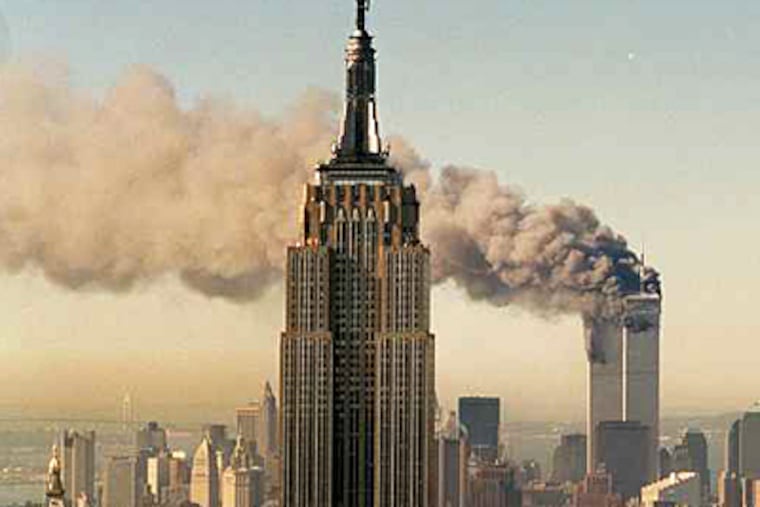
From the collapse of skyscrapers to the collapse of Wall Street, the decade that ends this week was one of the most tumultuous in memory.
Ten years ago, few Americans knew the name Osama bin Laden. Today, he influences how your tax dollars are spent and how you are screened at airports.
At the start of the decade, Facebook, Twitter, and YouTube didn't exist. Now, hundreds of millions of people communicate on them daily.
From Washington to Harrisburg to Wall Street, corruption and fraud dominated the decade. Philadelphia also grappled with corruption, violent crime, and population loss, even as Center City's skyline made way for its tallest building yet.
As the decade ends, crashes in the housing and stock markets coupled with the Great Recession have left many people facing a lower standard of living. Spiraling government debt threatens to burden the overall economy for decades to come.
Looking back, concerns at the end of 1999 about a "Y2K" computer-generated apocalypse now seem quaint. The world began the year 2000 without a hitch.
But that year also gave us one of the closest and most contentious presidential elections in U.S. history. The contest ended 36 days after Election Day, when the U.S. Supreme Court halted a recount in Florida.
George W. Bush was in office eight months when the United States was attacked on Sept. 11, 2001, by suicidal Muslim extremists from bin Laden's network. The devastation at the World Trade Center in New York, at the Pentagon in Washington, and in a Pennsylvania field killed nearly 3,000 people.
The federal government greatly expanded its surveillance powers after 9/11. The U.S. military invaded Afghanistan, where the attack originated, and Iraq, which had no link to the al-Qaeda plot.
The wars have cost more than $945 billion, and more than 5,300 U.S. military personnel have been killed. More than 35,000 U.S. soldiers have been wounded. Thousands of military families and their extended relatives have paid a heavy price in many ways.
The response to terrorism ignited an ongoing debate about whether the United States could sidestep the Constitution in the name of national security. The Bush administration held suspected terrorists at the U.S. military base at Guantanamo, Cuba, for years without trial or charges. The Supreme Court ruled that detainees can challenge their indefinite imprisonment in U.S. civilian courts.
Revelations of waterboarding and other torture caused the United States to lose some of its moral force internationally in the war against terrorism.
In 2005, Hurricane Katrina devastated New Orleans, killing well over 1,000, and raised questions about the government's competence to respond to such disasters.
The 2008 presidential race became a referendum on these issues. It resulted in an event many people never expected to live to see - Barack Obama being elected as the nation's first African American president.
Rep. Nancy Pelosi of California became the first female speaker of the House; Hillary Clinton nearly became the first woman nominated for president by a major political party.
In Philadelphia, it was a decade of change also. John F. Street was sworn in as mayor on Jan. 3, 2000. While his predecessor Edward G. Rendell had focused on Center City, Street vowed to transform neighborhoods with a massive antiblight program. The results were mixed.
As Street sought reelection in 2003, word leaked of an FBI probe of corruption at City Hall. Street won anyway and was never charged, but the probe uncovered pay-to-play crimes by his cronies.
Corruption brought down other public officials. Former State Sen. Vincent J. Fumo, Councilman Rick Mariano, and others got caught cheating the taxpayers. As the decade comes to a close, a wide-ranging criminal probe has snared 25 defendants in the legislature in Harrisburg.
Rendell won two terms as governor, and consistently boosted education funding while getting Pennsylvania lawmakers and taxpayers hooked on gambling.
In New Jersey, corruption continued to plague state government, and Trenton was rocked by the resignation of Gov. Jim McGreevey in a gay sex scandal.
Philadelphia's landscape changed significantly. Among the new buildings opened in the past decade are the National Constitution Center, the Cira Centre at 30th Street Station, and the Comcast Center - the city's tallest building, at 975 feet.
Veterans Stadium, home to the Eagles and Phillies since 1971, was imploded in 2004. Citizens Bank Park opened that same year; Lincoln Financial Field was opened in 2003.
Work also began on a $700 million expansion of the Pennsylvania Convention Center, on the Barnes Foundation's $150 million art museum on the Benjamin Franklin Parkway, and on the SugarHouse Casino on Delaware Avenue.
In 2008, Phillies fans finally got their victory parade on Broad Street as the team won the World Series. The Eagles, regular playoff contenders, lost the Super Bowl in 2004.
Street's administration was overtaken by corruption and a failure to combat violent crime effectively. His successor, Michael Nutter, was elected in 2007 after pledging to clean up City Hall. He has spent much of his term so far scrambling to control a fiscal crisis.
Financial concerns also persist at the national level as the decade comes to a close. The recession that began in late 2007 grew worse as Wall Street imploded in a series of banking scandals. Venerable investment houses such as Lehman Brothers went belly up, and huge bailouts multiplied. The federal government ended up owning General Motors.
All unthinkable 10 years ago. As the old decade draws to an end, it leaves us with innumerable challenges for the next one.